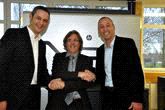Inkjet & Digital Printing
Etiketten CARINI Continues to Invest in Digital with a new HP Indigo WS6600 Digital Press

Friday 22. March 2013 - Digital print now accounts for 24 per cent of label jobs
HP today announced that Etiketten CARINI GmbH, of Lustenau, Austria, has installed an HP Indigo WS6600 Digital Press, its third WS6000-series press, to add capacity and ensure continuity of throughput.
CARINI is a company that has always been on the leading edge of technology, installing an Indigo Omnius in 1998, followed by an HP Indigo press ws4050 and a ws4500 in 2005. In 2009, CARINI replaced the ws4000-series presses with two HP Indigo WS6000 Digital Presses. All CARINI’s HP Indigo digital presses were supplied by HP Preferred Partner, Chromos AG, of Dielsdorf, Switzerland.
“Even though we doubled our digital capacity with the HP Indigo WS6000 digital presses, we needed more,” said Edgar Sohm, managing director, Etiketten CARINI GmbH. “We’ve seen digital print runs getting longer, and there are more jobs, too; the HP WS6600 press will enable us to meet these new demands.”
CARINI’s digital presses account for 24 per cent of jobs, while the rest is generated by the company’s eight conventional presses. Two near-line finishing machines from HP finishing partner A B Graphic International handle the output from the three HP Indigo presses.
“We print to a high-quality on a wide variety of substrates,” Edgar Sohm continued. “Coated and uncoated papers, films, transparent stock, monofillms and more recently metallic and silver films are among the stocks we regularly print.”
While Edgar Sohm notes the trend to shorter runs, he said that it’s difficult to say what an average digital run length is.
“We are seeing are increasing variations in what would have been long runs in the past,” Edgar Sohm explained. “It is possible to have a job of 50,000 metres that comprises 200 variations to accommodate different scents, flavours, languages and so on.”
Jobs that the company used to print as a long run once a year are now shorter runs produced several times a year. Handling more jobs – but not necessarily more labels – can create challenges for a company.
“The expense for the data-handling, clearance, customer care and such is the same whether the job is worth 300 or 5000,” said Edgar Sohm. “The administrative costs and the speed are crucial because the customer wants the delivery very fast.”
As a result, it is very important to invest in a fast, integrated workflow. To that end, the company spends a lot of time training, building technical knowledge, and using the best automation systems. CARINI has the HP SmartStream Labels and Packaging Print Server Powered by Esko that plays an important role linking prepress with the presses and integrating with the overall management information system.
“The kaizen philosophy of continuous change and improvement is an important part of our attitude,” Edgar Sohm said. “We ask ourselves all the time, ‘How can we make this better/faster/smoother?'”
With this focus on service, improvement and leveraging the best technologies, Etiketten CARINI has built its success and now has 130 employees and an annual turnover of 19.5 million, but the real goal is never out of sight:
“In a supermarket, all the jobs – conventional and digital – are on the shelf next to each other and it’s important that the customer notices no difference between them. With our HP Indigo presses, we are able to achieve this,” Edgar Sohm concluded.
